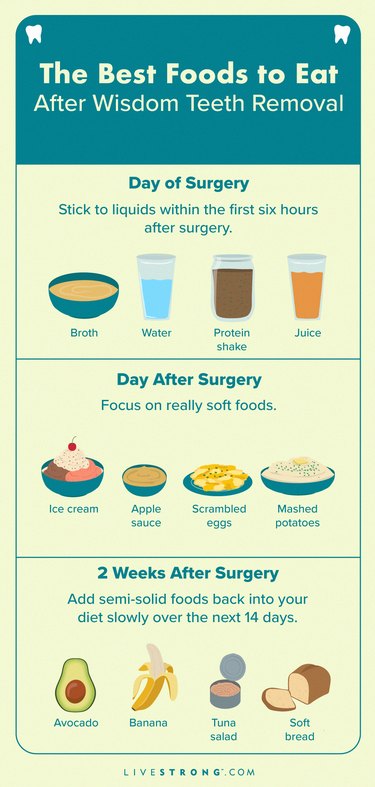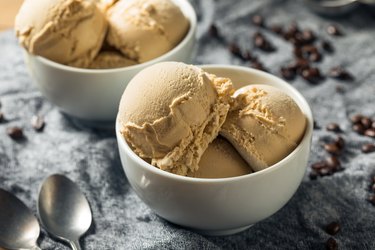

Wisdom teeth extraction is a serious procedure that can take up to six weeks to fully heal, per the American Association of Oral and Maxillofacial Surgeons (AAOMS). It's thus important to know the best foods to eat after wisdom teeth removal so you don't disrupt the recovery process.
To make your life easier, we've talked to Henry Ferguson, DMD, the program director of the Department of Oral and Maxillofacial Surgeons and associate professor at the Dental College of Georgia, about the ideal wisdom teeth food timeline.
Video of the Day
Video of the Day
In general, he says to stick to liquid and/or runny foods the day of and day after your procedure. For the week or two after that, eat soft foods that are easy to chew.
Then, "after three weeks, your soft tissue should be healed reasonably enough to where it can withstand some light attempts to eat," Dr. Ferguson says. "Your ability to chew some substantial foods should be better." In other words, you can eat many solid foods by this point.
At the four-week mark, you should be able to return to your regular diet, Dr. Ferguson tells LIVESTRONG.com. If it's still painful to eat certain foods at this point, you should call your doctor to make sure you don't have any complications.
To help you craft your post-surgery diet, here are Dr. Ferguson's recommendations for which foods to eat at different points in your recovery, including when you can eat meat after wisdom teeth removal.
Tip
Your oral surgeon will give you a full list of care guidelines after your surgery, per the Cleveland Clinic. If need be, they can tell you if it's OK to eat specific foods, like whether you can eat donuts, cake or shrimp after wisdom teeth removal.
What Are the Safest Foods to Eat After Wisdom Teeth Removal?
Liquids — Day of Surgery
Generally, you can expect some swelling and bleeding after your procedure, according to the Cleveland Clinic, which is why you want to take it easy when it comes to eating (as well as exercise after wisdom tooth removal).
Within the first six hours after surgery, Dr. Ferguson recommends having only liquids. Staying hydrated is key, so water, alkaline water and juices are great choices, according to The Oral Surgery Center.
Dr. Ferguson also suggests blending some of your favorite nutrient-dense foods into a smoothie to keep you satiated at meal times. So if you're wondering whether you can eat raspberries after wisdom teeth removal, it may be ideal to blend them into a shake.
"The day of, you should be really careful not to do too much eating," Dr. Ferguson says. Consistent chewing can be painful for your extraction sites, according to the AAOMS, so it's much better to drink your meals or eat foods that don't require chewing.
Additional suggestions from the AAOMS are:
- Broth
- Soup
- Protein shakes
However, it's important to avoid using straws while you're following a temporary liquid diet, Dr. Ferguson says, because sucking on straws can irritate your healing gums or potentially lead to a complication called dry socket.
Dry socket is when a protective blood clot over the extraction site becomes dislodged, painfully exposing your bone and nerves and increasing your risk for infection or delayed healing, according to the Mayo Clinic.
Mushy Foods — Day 1
"The first day [after surgery] you should eat really soft foods," Dr. Ferguson says. "Everyone is different, so it's really based on the patient's discretion. If you're eating something that's soft and it's uncomfortable, then eat something that's even softer."
For the day after tooth-extraction surgery, some foods to consider are:
- Scrambled eggs
- Mashed potatoes
- Grits
- Smoothies
- Pudding
- Gelatin
- Ice cream
- Yogurt
- Applesauce
Warning
Dr. Ferguson says the first three to five days are a crucial recovery period, as infections and complications are most likely to occur at this stage. If you're experiencing abnormal symptoms — like fever, excessive bleeding, pus drainage or facial numbness — see your doctor as soon as possible.
Soft Grains — First and Second Week
Throughout the first and second week following your surgery, Dr. Ferguson says to add semi-solid foods into your diet. He and the AAOMS recommend soft pastas and breads as one option.
So, what counts as soft? Basically, anything that doesn't require much chewing, according to the University of Washington School of Dentistry.
You should also make sure that none of the breads or pastas you pick contain hard bits like seeds, which can get stuck in your wound site and potentially dislodge your protective blood clot, putting you at greater risk for dry socket, per the UMass Chan Medical School.
Can You Eat a Donut After Wisdom Teeth Removal?
Because certain soft breads can be safe to eat at this point, you may be wondering if you can eat donuts after your tooth extraction. In general, if it's soft, doesn't contain any hard pieces like sprinkles and doesn't require much chewing, then it may be OK to eat a donut after your tooth extraction, per the University of Washington.
If you're wondering about other baked goods — like whether you can eat cornbread after wisdom teeth removal or if you can eat muffins after a tooth extraction — the same logic applies.
When in doubt, though, ask your doctor before eating something new.
Soft Fruits and Vegetables — First and Second Week
You can also enjoy soft fruits and vegetables during the week or two following your procedure, Dr. Ferguson says.
According to the UMass Chan Medical School, here are some popular options:
- Mashed bananas
- Avocado
- Mushy peas
- Soft, well-cooked vegetables
Just make sure to remove any seeds or other hard bits before digging in, per the UMass Chan Medical School.
Tip
Avoid acidic fruits like oranges and tomatoes, which may irritate the extraction site, according to the AAOMS.
Soft Meat and Fish — First and Second Week
Here's when you can eat meat after wisdom teeth removal: Typically, you can start to munch on certain types of soft meat during the first and second week following your procedure, Dr. Ferguson says.
For instance, you can eat finely cut fish and meat after wisdom teeth removal, as these don't put much stress on your teeth, jaw or gums, according to the AAOS.
What about other variations of meat — for instance, can you eat ground beef or chicken after wisdom teeth removal? According to the UMass Chan Medical School and Dr. Ferguson, some other good options include:
- Tuna or chicken salad (without chunks of harder food, like celery)
- Deli meat slices
- Meatloaf
- Ground beef
But again, use discretion for when you can eat meat after your tooth extraction. If something is tough, contains harder chunks or requires excessive or forceful chewing, then it's best to avoid it until further along in the healing process, per the University of Washington.
For instance, you may be wondering when you can eat steak or if you can eat sausage after your wisdom teeth removal. Unfortunately, these types of meat may be too tough or chewy for this phase of your recovery, and it's likely best to hold off until the extraction site has had more time to heal.
The same goes for eating shrimp after your tooth extraction — this chewy seafood may require more gnawing than is safe at this stage.
Similarly, you might be curious if you can eat hamburger after your tooth extraction. While Dr. Ferguson says ground beef is typically OK, other contents of a burger may not be suitable at this point. Crunchy onions, crispy bacon bits or sesame seeds on the bun, for example, may disrupt your healing wound.
Tip
If you're curious whether you can eat another type of meat after your tooth extraction, check with your doctor to make sure it's safe — they know best which foods to avoid after wisdom tooth removal, per the Cleveland Clinic.
What Foods Should You Avoid After Having Your Wisdom Teeth Removed?
Stay away from anything acidic, spicy or foods that require a lot of chewing. These include, per the Mayo Clinic:
- Chips
- Crackers
- Nuts
- Popcorn
- Raw, crunchy fruits and vegetables
- Seeds
- Citrus fruit
- Soda
- Fried foods
- Chili
- Fermented Foods
- Salsa
- Hot Peppers
Other things to avoid within the first week post-surgery include, per the Mayo Clinic:
- Alcoholic, caffeinated or carbonated beverages
- Drinking from a straw (the sucking action can dislodge the blood clot from the socket)
- Chewing gum
- Strenuous exercise/activity (might result in losing the blood clot from the socket)
How Should You Sleep After Wisdom Teeth Removal?
While there is no right way to sleep after wisdom tooth removal, sleeping with your head elevated by an extra pillow is recommended, per the U.K's National Health Service. Apply ice as needed and sleep in a cold, dark room to optimize your quality of rest.
5 Other Ways to Encourage Healing After Wisdom Tooth Extraction
Although having the right foods to eat after wisdom teeth removal can do a lot to help your recovery, there are some other things you can do to make the healing process easier.
"Home care and hygiene need to be maintained," Dr. Ferguson says. Here are suggestions from the AAOMS and other sources on ways to help your surgery sites heal:
- Brush gently twice daily.
- Rinse regularly. "You can use a syringe to rinse out the extraction sites and prevent food and debris from accumulating in the sockets," Dr. Ferguson says. He suggests loading the syringe with antibacterial mouthwash mixed with warm water. You could also use warm salt water. No rinsing should be done until 24 hours after surgery, per the University of Washington. After that, gently rinsing after meals is recommended.
- Reduce swelling. Icing your face on and off in 15-minute intervals during the first week may help relieve some of your discomfort, per the University of Washington. Your doctor might also tell you to sleep with your head elevated for a few days after surgery to help reduce swelling.
- Take all prescriptions as instructed.
- Do not smoke.
When Can I Start Eating Normal Food After Wisdom Teeth Surgery?
After the first week post-surgery, you should be able to return to semi-solid and solid foods, and by the four-week mark, you can return to your regular diet, Dr. Ferguson says.

- American Association of Oral and Maxillofacial Surgeons: "Wisdom Teeth FAQ"
- The Oral Surgery Center: "After Wisdom Teeth Removal"
- American Association of Oral and Maxillofacial Surgeons: "What to Eat After Wisdom Teeth Removal"
- Mayo Clinic: "Dry Socket - Symptoms and Causes"
- American Association of Oral and Maxillofacial Surgeons: "How Long Does it Take to Heal Following Wisdom Teeth Removal?"
- Cleveland Clinic: "Wisdom Teeth Removal"
- UMass Chan Medical School: "Soft Food to Eat After Dental Surgery"
- University of Washington School of Dentistry: "After Your Oral Surgery"
Is this an emergency? If you are experiencing serious medical symptoms, please see the National Library of Medicine’s list of signs you need emergency medical attention or call 911.